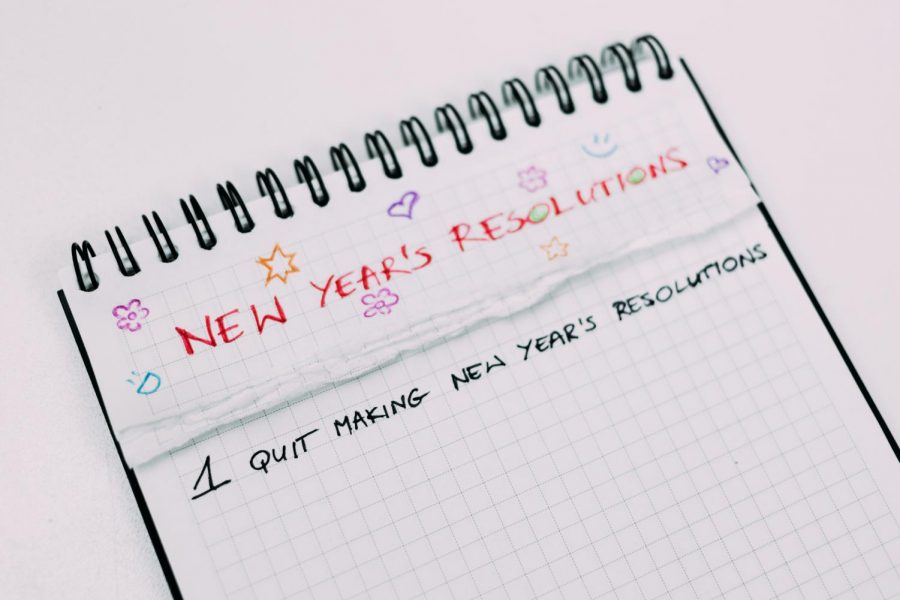Stop making New Year’s resolutions
February 7, 2018
They’re hurting you more than they’re helping you
This is how the typical New Year’s Eve plays out. The clock strikes midnight. Cheers — it’s officially the new year. People throughout the world celebrate, grateful to see another year through and excited to start it off on the right foot with the resolutions they have made. But these resolutions are actually doing more harm than good.
Many people view the new year as a time when they have a clean slate. It is the time for them to right their wrongs. A second chance to correct the previous mistakes they had made within the past year and plan for a more successful future.
To achieve this they make resolutions, personally committing themselves to make a change in their life. Forty percent of Americans make resolutions each year, according to Forbes magazine. The problem is most won’t keep up with the resolution for long. It’s a tradition in our society to make them, but customary for people to break them.
So, why do we keep making these New Year’s resolutions if we are only destined to fail? The answer is simple. We should not be making them in the first place.
Statistics show that only eight percent of people are able to maintain their New Year’s resolutions throughout the year. To make that number even more significant, an article published in U.S. News & World Report revealed that 80 percent of people will have broken their resolution by the second week of February.
The scientific explanation for why we can’t commit is called false hope syndrome. In studies done by psychology professors at the University of Toronto, they concluded that “this syndrome occurs when embarking on self-change attempts induces feelings of control and optimism that supersede the lessons of prior experience.”
In other words: when the new year rolls around, a sense of hope is in the air and we are all ready to make big commitments. But when reality sets in, that hype quickly dies down.
We have been making resolutions for thousands of years. Among the first to make resolutions were the ancient Babylonians about 4,000 years ago, according to History.com. The Babylonians used the opportunistic time of the new year to make promises to the gods, in hopes of beginning the new year in good grace.
Some of the most popular recurring resolutions today are: to lose weight, enjoy life to the fullest and spend less money, according to a 2016 article in Reader’s Digest. Others are simpler, such as to floss more, or cure your smartphone addiction.
Even celebrities make resolutions. Just this January, Shape Magazine reported that model Gigi Hadid made the resolution to live fearlessly. She wants to challenge herself by “doing more of what scares her.”
On the surface, it may seem like the idea of having a resolution is pretty great. The start of the year seems like the perfect time to make yourself a better person. But this is where we are getting it wrong, and why we shouldn’t be making resolutions at all. What encourages us to keep making resolutions each year is realization, but that realization is also what fuels false hope syndrome. So, in making a New Year’s resolution, we are actually taking away from its initial purpose of self-improvement.
Getting so caught up in the excitement of the new year and the possibilities to make this year truly the best year, many people are quick to forget this purpose. They make their resolutions based off of unrealistic ideals for themselves. Making a resolution out of your reach or too vague is most likely going to lead to you abandoning it, according to the American Psychological Association. No self-progress is being made.
This is the typical trend that resolutions follow. Studies done by the analytic company Cardlytics show that almost half of Americans bail on their gym membership by the end of January. Only 1 in 5 will make it to October, they reported.
Maybe you tell yourself that you will wait until the next year. But then the same mistake is made, and you fall into the 80 percent of people who won’t make it through February. A cycle forms where everyone keeps fooling themselves. We keep saying that we want to do better, but no one is actually doing it. This makes the resolutions become meaningless.
Instead of making a New Year’s resolution, make monthly goals for yourself. According to the American Psychological Association, you have a greater chance of making an effective change in your lifestyle if you start small and stay realistic.
Some examples of goals from the magazine Psychology Today are: walk one-third more than usual, take the stairs instead of the elevator, and drink a healthy smoothie each morning. No goal is too small if it makes you feel good about yourself.
New Year’s resolutions are doing more harm than good for society. While they are designed to make us want to do better, in effect, they lead us to only do worse. If you want to make a change in your life, do it. Don’t wait until the new year to plan “what if” when you could be working towards changing right now.








